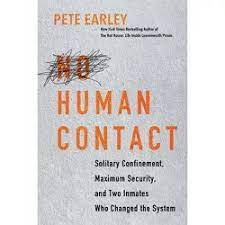
“After he ate his finger, they were taking him out of his cell and one of the officers asked him what his finger tasted like.”
(4-25-23) My new book: No Human Contact: Solitary Confinement, Maximum Security, and Two Inmates Who Changed the System, goes on sale today and while it documents the stories of two prisoners who were held for decades in complete isolation, there is a chapter about how the federal Bureau of Prisons mistreated seriously mentally ill prisoners at its most secretive, maximum security prison.
I fear the inhumanity at the ADX in Florence, Colorado, which became public only because of a landmark class action lawsuit that ended with the federal government promising reforms, is not that uncommon in many jails and prisons where individuals with severe mental illnesses are easy targets.

Ed Aro forced govt. to improve mental health care in prisons
This excerpt is a tough read, but necessary for those of us who love someone with a serious mental illness. It also is a warning and a tribute to Edwin Aro, a lawyer who took on the government.
NO HUMAN CONTACT: Solitary Confinement, Maximum Security and Two Inmates who Changed The System. By Pete Earley, Copyright, Pete Earley Inc. PublisherKensington Publishing.
Edwin Aro was not an activist attorney. His specialty at the Denver office of Arnold & Porter, one of the country’s largest and most prestigious law firms, was corporate litigation. The Colorado native had a reputation for coming in late to multimillion-dollar lawsuits between large companies and helping his clients turn a losing hand into a winning one.
His bosses asked him in 2011 to investigate a complaint by an ADX inmate who had been diagnosed with a serious mental illness. Under the BOP’s own regulations, prisoners with severe psychiatric problems were never supposed to be housed in the Super Max because of the austere, isolating living conditions there.
Aro and another lawyer drove to the prison expecting to find one or two mentally ill prisoners who had simply slipped through the cracks. Minutes after meeting inmate Richie Hill, the attorneys realized they were dealing with a much larger and alarming problem.
“Hill was a lunatic,” Aro said later in an interview. “He was not medicated and was completely insane and almost incoherent. It was impossible to spend five minutes with him and not realize how sick he was.” Aro found talking to Hill disconcerting because he’d tried to gouge out one of his eyes with his fingers causing his eyes to look in different directions.
After they met with Hill, Aro and his colleague interviewed another inmate who told them dozens of “Richie Hills” were being held on a separate ADX range called “the zoo.” Back in his Denver office, Aro telephoned the U.S. Attorney in Colorado and reported what he’d seen. He assumed the Justice Department would tell the bureau to move the prisoners. Instead, as he later put it in an interview, “They stiff armed us.” 
Aro began making more exploratory trips to ADX. The forty-seven-year-old litigator discovered that Hill had attempted suicide ten times, including once by placing pencil lead, rocks and pencil particles up his penis. He’d repeatedly begged the staff to transfer him to a mental hospital. Instead, the chief psychologist had offered Hill a radio in exchange for him stopping his complaining.
When Aro asked Hill what had happened to that radio, he replied: “I ate it.”
Hill believed diamond rings were embedded in his legs. He’d tried to pick them out, causing deep wounds that quickly became so infected, a worm emerged from one. “He wasn’t fed most of the summer I met with him,” Aro recalled. Prisoners were required to stand at the far back of their cells with their hands pressed against the wall when food trays were delivered. Hill was so psychotic, he’d spent his days and nights lying in his bed so he was passed over at meal times. “He’d lost fifty-five pounds in three months and had resorted to eating his own feces and rocks in his cell and they still wouldn’t give him Ensure or anything,” Aro said. “It was beyond horrifying.”
Aro said later that mentally ill prisoners rarely were able to “step down” to another prison. Hill would smear feces on his cell walls and himself and be issued a disciplinary shot by officers, meaning that his time at the ADX would be extended as punishment. “If you had a mental illness, you were not going anyplace because you kept getting into trouble for not following the rules and ended up getting more time.”
By the summer of 2012, Aro had enough to file his class action lawsuit but he held off after he received an unexpected call from U.S. Senator Dick Durbin’s office. The Illinois Democrat was holding the first ever Senate hearing about solitary confinement and he’d learned about Aro’s investigation. Aro supplied Durbin’s staff with background information and agreed to file his class action suit on June 18, 2012, the day before the Senate hearing. The suit contained horrifying stories about Hill and other ADX prisoners and when he filed it, those accounts got national attention. Reporters swarmed into the Senate Judiciary Committee hearing room the next day. Sen. Durbin grilled then BOP Director Charles E. Samuels Jr. who floundered when asked simple questions about the ADX. In Denver, Aro assumed the bad publicity would force the bureau to negotiate a settlement so his lawsuit wouldn’t have to go to trial. He was wrong. The bureau dug in even deeper.
While Aro’s lawsuit was slogging through the pre-trial process, Richie Hill developed a life-threatening staph infection in his legs. He became so crippled he was reduced to crawling around his cell, naked, in a pool of his waste, and rolling up and eating balls of his own feces. An angry Aro insisted the bureau send Hill to the U.S. Medical Center in Springfield. Fearful of more bad press, the bureau compiled. Hill was told that his legs might need to be amputated, but after three months of hospitalization and continuous IVs, his legs were saved and he became stable.
The BOP began transferring mentally ill inmates out of the ADX, but Aro kept finding more.
John Jay Powers was a fifty-year-old bank robber who’d witnessed an Aryan Brotherhood killing in prison and had testified against the gang. For five years, the BOP moved him from prison to prison to protect him from the gang. Powers developed Post Traumatic Stress Disorder and ended up at the ADX with AB members. Powers sliced off one his testicles, bit off a piece of finger, cut off another finger, and began putting staples into his face.
Another ADX prisoner, David Shelby had schizophrenia and had become convinced in 1995 that God wanted him to free Charles Manson by sending threatening letters to then President Bill Clinton. He arrived at the ADX in 2000 and after spending nine years in solitary confinement, tried to commit suicide by slashing his arms, legs and stomach. He’d cut off the top of his left pinkie finger and eaten in in a bowl of ramen. “After he ate his finger, they were taking him out of his cell and one of the officers asked him what his finger tasted like,” Aro said. “That perfectly illustrates how fucking insensitive these people were at the ADX. It was a level of inhumanity that was unfathomably to me.”
Aro leaked word about Powers and Shelby to the media and in October 2013, he filed an emergency motion asking a judge to force the bureau to transfer a 29-year-old prisoner named Jonathan Francisco to a hospital. “Three weeks earlier, a psychotic prisoner had killed himself and we thought Francisco was about to do the same thing,” Aro said. Francisco spent his days in his feces covered cell staring at the wall. The stench became so overpowering it leaked under his cell’s steel door. Officers piled sandbags against the door to keep the pungent odor trapped inside. Once again, Aro tipped off the press. A judge scheduled a hearing on Aro’s motion to transfer Francisco and when the two sides appeared, one of the BOP’s lawyers chastised Aro for using the media to pressure the government.
The lawyer said, “My people are professionals and they feel terrible about being accused of misconduct.” Aro leaped to his feet, “Fuck this! You killed one of my people three weeks ago (a suicide) and you almost killed another one of my people a few months ago (Richie Hill). You have killed a bunch of my people so I don’t give a fuck about your feelings. Either you are going to get serious about resolving this or we’re going to destroy you in court!” Francisco was transferred and Aro’s profanity laced outburst became a turning point in negotiations. It would still take three more years before both sides agreed on a process for transferring psychotic prisoners out of the ADX and expanding bureau psychiatric services.
“I was dealing with levels of anger swelling up in me,” Aro recalled. “The thing that made me the most angry was that the staff at the BOP had normalized this stuff in a way that Richie Hill losing fifty pounds and eating rocks and feces and crippled on the floor in his own urine and feces didn’t set off alarm bells. Anyone with any kind of conscience should have looked at that and said, ‘That’s just not how we should be doing things.’”



